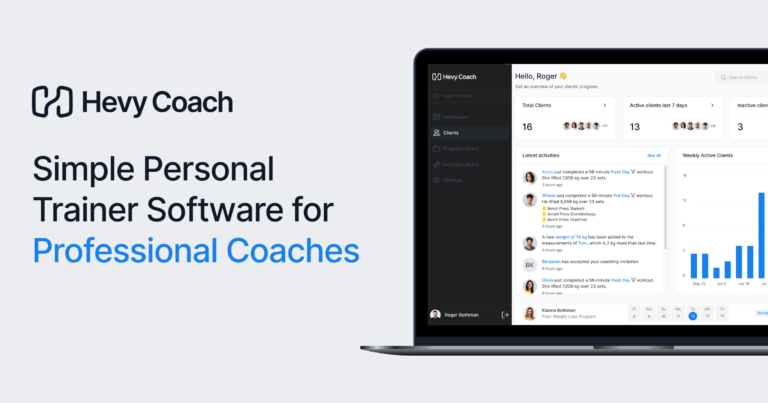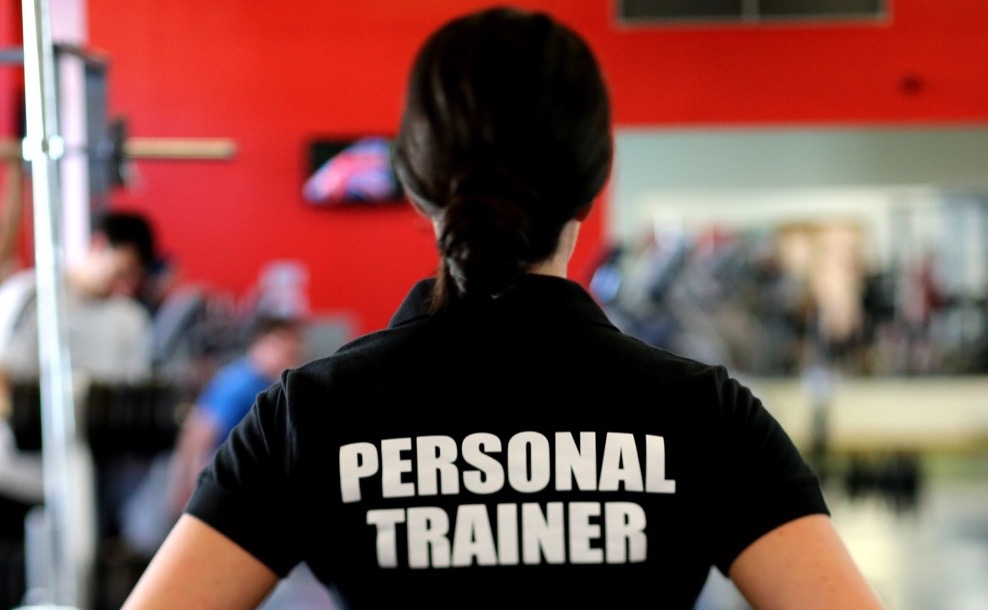Are you a gym enthusiast who appreciates a heavy set of deadlifts and enjoys learning about the science behind fitness? Do you like helping others lead a healthier and fitter lifestyle? Have you ever envisioned yourself pursuing a career where you guide others to success?
If any of these apply, then a career in personal training could be the right fit because it would allow you to share your knowledge and passion with those in need. Even better? You would be able to earn good money doing what you love.
But how long does it take to become a personal trainer, and what are some of the challenges you will face along the way?
Read on because we are breaking it all down for you today.
How Much Does it Cost to Become a Personal Trainer
Personal training certification programs cost around $1,000. Some programs, like the NSCA, offer an exam-only package, which costs under $500, but you must get all the study materials independently. Other potential expenses include getting your CPR/AED certification, starting your PT business, and getting essential tools (e.g., equipment for your studio).
The Cheaper… the Better?
It’s no secret that the cost of products and services influences our buying decisions. If two products look and feel identical, we would be more likely to go for the cheaper one, which makes sense.
Financial discipline is crucial if we ever hope to save money, feel more secure, and be better prepared for the curveballs life inevitably throws our way. (Well, not everyone buys cheap products to save money for a more secure future, but that’s the general goal and what we like to tell ourselves.)
The above also applies to personal trainer certification programs. Cheap programs and courses are more alluring because they seem good enough and can get us to our ultimate goal: becoming a certified personal trainer.
Unfortunately, while spending $99 or $199 instead of $999 might seem like a sound financial decision, that isn’t necessarily true, as there is more to consider than the program’s cost.

Cheaper certification programs appear good, but there are three significant problems with them:
- Cheaper personal trainer certifications don’t hold the same value as the more expensive ones like ACE and NASM. For example, becoming an ACTION CPT will set you back $99. Even the more expensive bundles cost only $149 or $$249, which is far less than what you would pay to earn a more reputable certification.
However, despite the cost, ACTION is a newer program (it gained its accreditation in 2014), far fewer people know about it, and you’re unlikely to impress fellow fitness professionals, prospective employers, or clients.
Did you know ACTION existed before you read about it just now? Exactly. - Cheaper personal training certifications don’t come with the same scope, depth, or overall quality of education. However, the exams are typically easier to pass, which means you don’t need to spend as much time or effort learning.
While that might sound like a good deal, it isn’t. Easier preparation means you gain far less knowledge and aren’t as prepared to be a personal trainer. Plus, more people could pass the exam and earn their certification, bringing its overall value down. - The final issue isn’t as big a deal, especially if you do your due diligence, but there is still a risk. Cheaper and more obscure personal trainer certification programs are more likely to be scams.
In contrast, enrolling in one of the top programs would put your mind at ease because you would know precisely what you’re getting. More importantly, you would rest easy knowing that your new title holds value in the fitness industry and can push your personal training career forward.
Plus, accreditation is crucial. The program you choose should be recognized by the NCCA, HLC, DETC, or DEAC––for example, ACE, ISSA, NASM, ACSM, NSCA, and NCSF. We’ll break each of these down in the following points.
Are you interested in a simple tool to create programs for your clients, make adjustments at the click of a mouse, monitor progress, and communicate? Check out Hevy Coach––the ultimate client management platform that allows you to do these and many other things from a single dashboard.

Try Hevy Coach
Intuitive personal trainer software, with a world class experience for your clients.
30 day free trial, no credit card required
The 6 Best Personal Training Certification Programs (Price Comparison)
1. American Council on Exercise (ACE) – from $675
ACE is accredited by the National Commission for Certifying Agencies (NCCA), and a personal trainer certification from the organization holds a lot of weight in the fitness industry. It is one of the most recognized certification options that is sure to open many doors.
The American Council on Exercise offers several study programs for aspiring personal trainers, with the basic option being the cheapest at $675. You can pay in full or opt for interest-free payments.
Their Basic plan offers:
- Access to ACE University––an online teaching platform that simplifies the learning process
- ACE certification exam (you can take it from home)
- One practice test
- ACE personal trainer textbook (digital)
- ACE PT study companion (digital)
Next, we have the ACE Plus plan, which costs $745 and includes everything you would get in the Basic plan plus:
- An extra practice test
- A hard copy of the PT textbook and PT study companion
- ACE Answers (Plus) – live Q&A webinars held by ACE study coaches
- Exercise Science 101 – a bonus supplement course designed to deepen your understanding of anatomy and physiology
- Free standard shipping in the US
Finally, we have the ACE Advantage plan. It costs $975 and includes everything from above plus:
- Two additional practice tests
- An audiobook version of the PT textbook
- ACE Answers (Advantage) – Facilitated Study Groups
- Free expedited shipping in the US
You can learn more about ACE, the study programs, and the packages here. ACE runs discounts from time to time. You can get one of these packages for half the price during a sale.
Despite the cost, an ACE personal trainer certification is an excellent option for aspiring professionals. All program options provide a well-rounded approach to teaching pupils everything they need to know about exercise science.
One complaint from students is that ACE doesn’t place as much emphasis on resistance training and proper technique. This is somewhat strange, given that a considerable part of being a personal trainer is walking clients through different exercises, teaching them cues, and helping them learn to self-correct when necessary.
While the scope and depth of the theoretical knowledge are excellent, more emphasis should be placed on the practical side of coaching clients.
2. International Sports Sciences Association (ISSA) – from $948
ISSA is another personal trainer certification worth considering. Unlike the other options on our list, this one is internationally recognized. (After all, its name starts with International.)
As a direct competitor to NASM, which we will look at next, ISSA is a solid personal trainer program worth considering if you want to get your foot in the door.
Like ACE, ISSA is rather expensive. The program costs $948, but you can opt for 6 or 12 interest-free monthly payments of $158 or $79, respectively. You can also make your remaining payments early with no penalties.
The way the program works is straightforward:
- Enroll to gain instant access to the study materials.
- Study at your pace.
- Take the recommended practice quizzes.
- Take the final exam from anywhere.
Speaking of the study materials, the program goes over all crucial areas of personal training, including:
- Physiology and anatomy
- Building custom training plans
- Help clients build strength safely
- How to improve your client’s diet
- Motivation and accountability
The program’s cost includes all the necessary study materials and the final test. However, you must prepare and take your final exam within six months of enrolling in the course.
Fortunately, the folks at ISSA are generous enough to offer a money-back guarantee to people who earn their certificate but fail to land a job within six months. However, they must cover a few criteria first:

According to reviews from people who have taken the ISSA course, the quality and depth of the information are good. You gain a good understanding of anatomy and physiology, exercise science, and other relevant information you need to walk into a gym and start training clients.
ISSA also offers good options for professional advancement with specialty courses. For example:

As you can see, ISSA offers three primary options for further advancement. For instance, those who aspire to rent a studio and teach group classes could benefit from Advanced Group Training.
The good news is that each includes a nutritionist certification, which adds a layer of credibility and expands your skill set. You can learn about the differences between a personal trainer and a master trainer here.
3. National Academy of Sports Medicine (NASM) – from $899
A NASM certification is among the more prestigious in the fitness industry. It is perhaps the most popular personal trainer certification program in the US, along with ACE.
The program significantly improved from the 6th to the 7th edition and now includes more relevant information to help professional trainers. But before we talk about that, let’s first go over the cost of the certification.
Like other programs on our list, NASM offers multiple payment options. The first option is Self-Study, and it costs $899. It includes:
- The NCCA-accredited exam
- Digital learning platform
- Educational videos
- Audio chapter summaries
- Exercise demonstration library
- Biodigital 3D models
- Resources Library
- Practice exams and quizzes
- Virtual coaching specialization
The second option is Premium Self-Study. It costs $1399 and includes all of the above plus:
- Job guarantee (learn about it here)
- A year of NASM EDGE Plus (a phone app)
- Certification exam re-test
Next, we have the CPT Essentials Bundle, which is their most popular. It costs $2397 and includes everything from the previous two packages plus:
- Certified nutrition coach document
- CPR/AED certification
Finally, we have their premium option: the New Year’s Exclusive Bundle. It costs $3295 and includes everything from above, as well as weight loss specialization.
All of these come with the option for 12 interest-free payments. You can also find the packages heavily discounted at times, as NASM runs seasonal sales and discounts (as much as 45 percent off).
As mentioned above, the NASM personal trainer certification has seen huge improvements since the last update. It is now geared toward effective and practical resistance training that works in the real world.
The program no longer focuses on silly balance movements but instead strives to teach aspiring coaches the fundamentals of strength training. Speaking of that, the program’s previous iteration placed significantly less emphasis on actual resistance training, which is no longer the case.
Their materials are now geared more toward fundamental lifts, biomechanics, and how to teach that information to new clients.
Another significant improvement is that the study materials no longer place as much emphasis on excessively long warm-up and cooldown periods. If you’ve ever coached people in the real world, you probably realize how tedious and unnecessary these can be for most people.
4. American College of Sports Medicine (ACSM) – from $879
ACSM is another well-known and reputable personal training certification. The program is NCCA accredited, and the information presented is of great quality.
In contrast to most other options, ACSM is slightly cheaper. The study materials cost as little as $600, and the CPT exam costs $279 with an ACSM membership. Speaking of the membership, the annual cost is $30, $110, $160, or $260. You can learn about them here.
The price of the exam is $349. You don’t need a membership, but for as little as $30 per year, it gives you access to a lot of helpful information that can make you a better personal trainer and help you pass the final exam.
Overall, the course material is highly beneficial because the information covered is specific to personal training with a decent emphasis on science.
ACSM is respected in the scientific community because of its involvement in research. Their research is recognized, accepted, and cited by fitness professionals, experts, and researchers from other institutions.
Unlike some of the programs in the personal training industry, ACSM focuses more on the corrective side of resistance training by teaching students how to fix muscle imbalances and help clients develop core strength.
Nevertheless, the study material goes over a broad range of topics, covering each thoroughly to help you become a successful personal trainer.
One potential drawback to remember is that the textbook is complex, and some students struggle to go through the whole thing. Unfortunately, there aren’t many other study materials to lean on if you’re not great with books.
For instance, NASM study materials include videos, audio files, summaries, quizzes, tests, and other aids to help you consume information in various ways and solidify it in your mind. That isn’t the case with the ACSM materials, which inevitably affects the exam pass rate.
5. National Strength and Conditioning Association (NSCA) – from $300
The NSCA is another reputable and influential personal trainer certification program that can open many doors for you.

Unlike other programs on our list, the NSCA offers the option to purchase the CPT exam without any study materials if you wish (and if you think you can pass). The exam package costs $435, but you can snag it for $300 with an NSCA membership.
Annual student membership costs $70, a professional membership is $130, and a CPI membership is $359. You can learn more about each here.
The second option is the NSCA-CPT Essential Package. Its regular price is $320, but you can get it for $260 with a membership. It includes the Essentials of Personal Training (third edition) textbook, the NSCA-CPT study guide, and 200+ practice questions.
Your final option is the NSCA-CPT Essential Plus Package, which costs $565 without a membership or $465 with one. It includes everything from the previous package plus:
- Online Study Course (self-guided)
- Exercise Technique Manual (fourth edition)
Neither of these packages includes the accredited exam––you will have to purchase that separately from the coursework.
Given the overall value of the NSCA membership and the available discounts, your best option is to purchase it before buying the study materials or exam. Even if you’re confident in your knowledge and expertise, the membership will provide access to valuable materials to help you prepare and pass on your first try.
Speaking of that, the exam difficulty is higher than in some other CPT programs, and the average pass rate was 66 percent in 2022. Additionally, the exam is available in five foreign languages: Spanish, Chinese, Japanese, Italian, and Korean.
The study material itself is good. However, it seems less comprehensive than what you would get from other programs, such as ACE, ISSA, and NASM. These programs include various study materials, including written text, videos, audio files, and quizzes, making it easier to absorb new information and regularly test your knowledge.
In contrast, NSCA seems a bit one-dimensional. You still learn a lot of valuable information, and the certification garners respect among fellow fitness professionals, hiring managers, and prospective clients.
However, you’re more likely to feel unprepared to start training people in a gym once you earn your title.
6. National Council on Strength & Fitness (NCSF) – from $799
NCSF is another personal trainer certification program that’s been growing in popularity among aspiring fitness professionals. The exam is NCCA-accredited, similar to ACE, NASM, and ACSM.
Like other programs on our list, NCSF offers several payment options. Here is a brief look at each:
- Home study ($799)
- Home study + ($899)
- CPT + SNS ($1299)
- CPT + CSC ($1399)
Each package includes all the study materials you need to pass the exam. The cost of the certification exam is also included.
Study materials include a textbook (digital or hardcopy, depending on the package), instructional videos, lesson notes, Q&A segments, quizzes, ongoing support, and an NCSF membership for a year.
Home Study is ideal for those aspiring to get their certification and start work as personal trainers. Home Study + is the same; the only difference is that it includes a hard copy of the textbook.
From there, we venture to the more specialized packages: CPT + SNS and CPT + CSC. The former is for personal trainer and sports nutrition certifications, which provide a competitive edge and help you stand out in today’s competitive job market.
More importantly, being a sports nutrition specialist and a certified personal trainer can help you serve your clients better and provide a complete plan to help them reach their goals.
The latter of the two packages is for personal training and strength coach certifications. It is ideal for fitness professionals looking to specialize in resistance training with an emphasis on strength training and programming.
NCSF runs discounts and seasonal sales, which means you can snag any of these packages with a considerable discount. At the time of writing, the cheapest package (Home Study) costs just $399, which is a bargain for what you get.
Overall, the information presented is good, and it helps you gain access to most of the information in several formats. The textbook will be your study companion from start to finish, but you can also watch educational videos, take quizzes, participate in Q&A segments, and review lesson notes for quick reference.
Personal Trainer Certification Cost Summary (Comparison Table)
| Program | Starting Price | Time to Complete |
| ACE | $675 | 3 to 6 months |
| ISSA | $948 | 3 to 5 months |
| NASM | $899 | 3 to 6 months |
| ACSM | $879 | 3 to 9 months |
| NSCA | $300 (exam-only package) | 6 months |
| NCSF | $799 | 3 to 6 months |
Each program has unique advantages, and you wouldn’t go wrong with any of them because the study materials are good, you get to develop a solid foundation for personal training, and these certifications garner respect in the fitness industry.

Try Hevy Coach
Intuitive personal trainer software, with a world class experience for your clients.
30 day free trial, no credit card required
Related article: How to Become a Personal Trainer in 2024: The Ultimate Guide
Beyond Certification: 3 Other Expenses Related to Becoming a Personal Trainer
1. Potential Business Costs
Not everyone will have these expenses, but those interested in running a personal training business should be ready to make a significant investment. Some potential business expenses include:
- Renting a studio
- Paying water, heat, and electricity bills
- Purchasing equipment
- Registering a business
- Getting liability insurance
- Hiring an accountant
- Investing in online ads and marketing
As a new trainer, working under another coach for a while might be better to gain experience and build a client roster.
Related article: How to Start Personal Training Business in 7 Steps
2. Tools
Having the right tools can make your job far easier. For example, Hevy Coach is a platform for trainers and coaches. It allows you to keep track of all clients from a single dashboard.
You can assign training programs, make adjustments when necessary, gain access to progress metrics, answer their questions, and much more. Using it with one client is free, but the monthly subscription for two or more clients starts at $10.
Other tools that can benefit you include Quickbooks (for business management), Canva (to create promotional flyers and such), and Hootsuite (to manage your social media profiles from one dashboard).
3. Travel and Commute Expenses
Most personal training programs can be completed from home, saving you time and money on commuting. However, some require attendance for certain activities. For instance, NASM has proctoring locations for the final exam.

Always factor in such costs, especially if you’re going to be commuting frequently.
Are Free Personal Training Courses a Good Alternative?
Free personal training courses are widely available. A quick Google search will net you dozens, if not hundreds, of results, most of which appear just as good as paid programs. So, the question is, why pay for your certification when there is so much information freely available today?
The Value of Free Courses
Coaching is about continuing to learn, improve, and refine your practice. Too many certified personal trainers think that going through their preferred course and passing the exam is all there is and that it is all smooth sailing from there.
The truth is, you must be open to adapting and possibly even changing your view when presented with new facts. However, you must be proactive and expose yourself to new ideas from various sources, including research, research reviews, and other forms of content (blog articles, books, YouTube videos & shorts, podcasts, courses, etc.).
Free courses can be valuable because they present information on specific topics in a formatted and organized way.
The Drawbacks of Free Courses
Despite their benefits, free courses are not an alternative to personal training certification programs. These are simply supplementary learning materials to broaden your knowledge and boost your expertise.
Even if some of these courses allow you to earn general PT certifications, the value of such titles would be inherently lower than what you would get from ACE, NASM, or another reputable program.
Sure, you can claim to be a certified personal trainer, but how valuable would the title be if it comes from an obscure program? Would you be able to land a job at a good gym? Would people jump at the opportunity to hire you as their trainer?
The truth is that going through one of the above personal trainer certification programs prepares you for the job and increases your credibility, both of which are crucial if you hope to make it in this competitive job market.
6 Reasons Why You Need the Right Certification
1. It Demonstrates Expertise and Credibility
I will be the first to say that a piece of paper doesn’t define you. Not having a prestigious diploma or certification doesn’t mean you’re a bad coach, just as having one doesn’t automatically mean you’re good at your job.
However, people value titles because they hint at a strong work ethic, discipline, willingness to invest in yourself, and at least some knowledge and expertise. For example, when someone says they are a NASM-CPT, you know they’ve gone through a challenging program and have learned enough to pass the difficult exam.
The same goes for ACE, ISSA, and other personal training certifications.
2. It Boosts Your Chances of Landing a Good Job
A certification from a reputable organization makes it easier to land an internship at a good gym and potentially earn a full-time position once you go through their mandatory training.
For instance, ISSA offers a full refund to certified personal trainers who fail to get a job within six months of passing the exam.
In some cases, as with the NASM, the most expensive package comes with a guaranteed gym internship, allowing trainers to jump into the field and gain experience immediately.
3. It Increases Your Earnings Potential
How much money you make as a personal trainer depends on many factors, including your communication skills, client management, knowledge, and willingness to continue educating yourself.
With that said, a good certification opens more doors for you, providing access to more clients who are willing to pay top dollar to work with you.

4. It Provides a Foundation of Knowledge and Expertise to Build Upon
As discussed above, the best personal trainer certification programs provide a foundation of knowledge by teaching you essentials about physiology, anatomy, biomechanics, client management, etc.
That foundation allows you to develop further and specialize if you desire. For example, you can start with a personal training certification and later transition into group coaching, corrective exercise, nutrition, etc.
For instance, ISSA offers additional courses on top of the PT certification: HIIT, strength and conditioning, nutrition, bodybuilding, and more.
Similarly, the NCSF offers more expensive packages that combine personal training credentials with a nutrition or strength coach certification.
5. It Encourages Long-Term Growth as an Expert
Most CPT programs require recertification every few years to ensure that everyone who wants to stay certified is up to date with the latest developments in exercise science.
Here is a list of the above programs with the respective recertification deadlines:
- ACE – two years
- ISSA – earn 20 continuing education units (CEUs) every two years
- NASM – two years
- ACSM – three years
- NSCA – three-year cycles
- NCSF – two years
While recertification might seem like a hassle, there is a lot of value in going through the study materials and getting your CEUs.
Related article: Fitness Coach vs. Personal Trainer: Choosing Your Path
6. It Helps the Client Trust You
The final and perhaps most important benefit of personal trainer certifications is that clients feel at ease and trust you more.
It all goes back to one of the previous points that a certification displays knowledge and expertise. Having one doesn’t necessarily mean someone is an expert, but try landing clients without it.

Try Hevy Coach
Intuitive personal trainer software, with a world class experience for your clients.
30 day free trial, no credit card required
Final Words
Becoming a certified personal trainer requires an upfront investment in study materials and exam taxes.
Certification costs for the most popular and reputable programs in the US range from $300 (the NSCA’s exam-only package) to well over $2,000 for the premium packages with all the bells and whistles.
The good news is that you don’t need to enroll in the most expensive program because even the basic packages can prepare you for the exam. ACE, ISSA, and NASM are three fantastic options and cost roughly the same. Slightly more affordable options include ACSM and NCSF.
However, despite the upfront investment, enrolling in such a program will pay dividends. A certification boosts your credibility, allows you to land a better job, and increases your earnings potential because you gain access to high-paying clients.
Free personal training courses might seem like a great alternative. However, these aren’t designed to replace a certification program but to supplement your education.
If you are ready to pursue a career in personal training, having the right tool at your side will make your job much easier. To that end, we encourage you to check out Hevy Coach––the all-in-one platform for coaches and trainers, where you can keep track of your entire roster from a single dashboard. Write programs, answer questions, track progress, make adjustments, and more.
FAQs
1. How long does it take to become a personal trainer?
Most personal trainer certifications take three to six months to attain. How quickly you manage to do that will depend on your dedication, learning speed, and prior knowledge.
Most gyms will then require you to complete an internship lasting up to 12 weeks.
2. Are there any additional costs associated with becoming a personal trainer?
Aside from the cost of earning your certification, there could be extra costs like purchasing additional study materials, commuting for classes and tests, and getting liability insurance before you start work.
3. Are there any ways to reduce the cost of becoming a personal trainer?
There are a couple of ways to reduce the cost. First, wait for discounts and seasonal sales to save up to 50 percent. Most certification programs run at least a few of these each year.
Second, you can look for more affordable programs or pick an exam-only package like the one NSCA offers. These cost far less because they don’t come with study materials.
4. How much can I expect to earn as a personal trainer?
As of 2024, the average salary for personal trainers is $27.11 per hour, or just over $45,000 per year. The average personal trainer rates are $40 to 70, but how much you can charge depends on multiple factors, including location, client base, and your reputation.
Learn more: Personal Trainer Incomes in 2024: What to Expect
5. Is it worth the cost to become a personal trainer?
Personal training can be a lucrative and fulfilling career. However, whether it makes sense for you depends on your goals and aspirations. A PT career can be gratifying if you’re passionate about fitness and love helping others.
However, if you’re on the fence, consider all the costs associated with your education, certification, and potential business startup before embarking on that journey.




